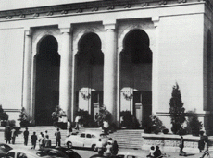More languages
More actions

The 8th National Congress of the Communist Party of China (中国共产党第八次全国代表大会) was held in Beijing from September 15th to 27th, 1956. There were 1021 delegates present and 5 people asked for leave. There were 107 representatives present.[1]
Reports[edit | edit source]
Mao Zedong delivered an opening speech, Liu Shaoqi made a political report, Deng Xiaoping made a "Report on Amending the Party's Constitution", and Zhou Enlai made a "Report on Proposals for the Second Five-Year Plan for Developing the National Economy."[1]
Measures Passed[edit | edit source]
The Congress made a scientific judgment on the main domestic contradictions after the socialist transformation was basically completed; determined a series of policies for political, economic, cultural and diplomatic work; raised the issue of building the ruling party and emphasized the need to uphold democratic centralism and collective leadership system, oppose the cult of personality, develop inner-party democracy, and strengthen the relationship between the party and the masses. The "Constitution of the Communist Party of China" adopted by the congress embodies the characteristics of the ruling party, emphasizes the implementation of the party's principle of democratic centralism and the mass line, and stipulates that the national, provincial and county-level congresses implement a permanent system. The General Assembly passed the "Resolution on the Political Report" and the "Proposal on the Second Five-Year Plan for the Development of the National Economy".[1]
Election Results[edit | edit source]
The Congress elected a Central Committee consisting of 97 members and 73 alternate members. The ensuing First Plenary Session of the Eighth Central Committee elected the Political Bureau of the Central Committee and its Standing Committee, elected Mao Zedong as the chairman of the Central Committee, Liu Shaoqi, Zhou Enlai, Zhu De, and Chen Yun as the vice-chairmen, Deng Xiaoping as the general secretary; elected 17 members and 4 Central Supervisory Committee composed of alternate members.[1]
- ↑ 1.0 1.1 1.2 1.3 "Introduction to the Eighth National Congress of the Communist Party of China". People's Daily Online.
